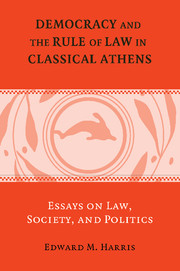Book contents
- Frontmatter
- Contents
- PREFACE
- ACKNOWLEDGMENTS
- ABBREVIATIONS
- INTRODUCTION
- I LAW AND CONSTITUTIONAL HISTORY
- II LAW AND ECONOMY
- III LAW AND THE FAMILY
- 1 Did the Athenians Regard Seduction as a Worse Crime than Rape?
- 2 Did Rape Exist in Classical Athens? Further Reflections on the Laws about Sexual Violence
- 3A Women and Lending in Athenian Society: A Horos Re-Examined
- 3B Notes on a Horos from the Athenian Agora
- 4 The Date of Apollodorus' Speech against Timotheus and Its Implications for Athenian History and Legal Procedure
- 5 A Note on Adoption and Deme Registration
- IV ASPECTS OF PROCEDURE
- V ENVOI
- BIBLIOGRAPHY
- INDEX LOCORUM
- SUBJECT INDEX
1 - Did the Athenians Regard Seduction as a Worse Crime than Rape?
Published online by Cambridge University Press: 25 February 2010
- Frontmatter
- Contents
- PREFACE
- ACKNOWLEDGMENTS
- ABBREVIATIONS
- INTRODUCTION
- I LAW AND CONSTITUTIONAL HISTORY
- II LAW AND ECONOMY
- III LAW AND THE FAMILY
- 1 Did the Athenians Regard Seduction as a Worse Crime than Rape?
- 2 Did Rape Exist in Classical Athens? Further Reflections on the Laws about Sexual Violence
- 3A Women and Lending in Athenian Society: A Horos Re-Examined
- 3B Notes on a Horos from the Athenian Agora
- 4 The Date of Apollodorus' Speech against Timotheus and Its Implications for Athenian History and Legal Procedure
- 5 A Note on Adoption and Deme Registration
- IV ASPECTS OF PROCEDURE
- V ENVOI
- BIBLIOGRAPHY
- INDEX LOCORUM
- SUBJECT INDEX
Summary
Λυσíας ὁ σοφιστής
– [Demosthenes] 59.21one of the most ingenious arguments in all of attic oratory is to be found in the speech Lysias wrote for Euphiletus to deliver at his trial for the murder of Eratosthenes (Lys. 1.30–5). In his speech Euphiletus first describes to the court how his wife was seduced by Eratosthenes, then recounts how he discovered the affair, caught the adulterer in the act, and despite an offer to pay compensation, slew him. Euphiletus defends his action by citing the law of the Areopagus that whoever kills an adulterer caught in flagranti with his wife cannot be convicted of murder. Euphiletus further points out that the same exemption applies to the man who catches someone seducing his pallake. If the lawgiver regarded the seduction of a pallake as so serious that it merited the death penalty, Euphiletus argues, he must have regarded the seduction of a wife as even more reprehensible, deserving a penalty worse than death.
Euphiletus then proceeds to claim that the lawgiver considered rape a far less serious crime than seduction. In support of his point, he had the clerk of the court read out a section from another law. He singles out two provisions from this law, first, that the man who rapes (αἰσχύνῃ βíᾳ) a free man or a child shall pay only damages, and, second, that the man who rapes a woman shall be liable to the same penalty. From these provisions, he concludes that the lawgiver thought that rapists merited a less severe penalty than did seducers, for he punished the former merely with a fine, but the latter with death.
- Type
- Chapter
- Information
- Democracy and the Rule of Law in Classical AthensEssays on Law, Society, and Politics, pp. 283 - 296Publisher: Cambridge University PressPrint publication year: 2006
- 1
- Cited by



